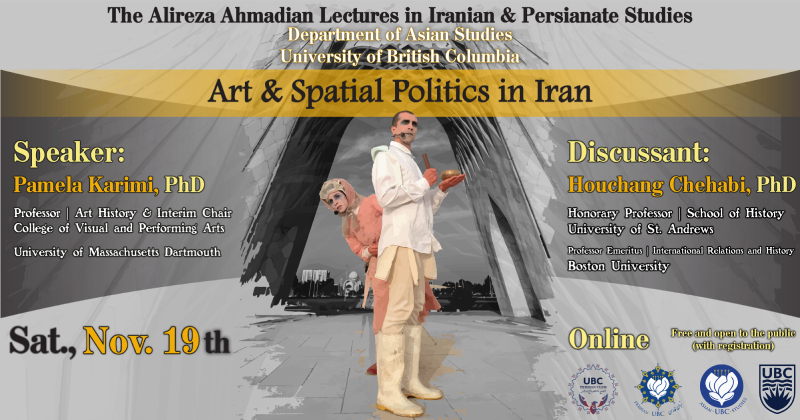

Poster design by Razman Goudarzi
هنر و سیاست فضا و مکان در ایران
سخنران: دکتر پَملا کریمی، استاد تاریخ هنر و سرپرست کالج هنرهای تجسمی و نمایشی دانشگاه ماساچوست در دارتموث
طرفبحث: دکتر هوشنگ شهابی، استاد افتخاری دانشکده تاریخ دانشگاه سنت اندروز
کتاب «ایرانِ بدیل» با نگاه به عرصههای هنری ایران از دههٔ ۱۹۸۰ میلادی به این سو، عوامل اقتصادی، سیاسی و فکریای را بررسی میکند که طبقهٔ خلاق ایران را به سمت اَشکال بدیع و غیرمتعارفی از هنرآفرینی سوق داده است. این آثار هنری که برای موزهها یا سالنهای نمایش طراحی نشده است، در خانههای شخصی، نمایشگاههای هنری غیرتجاری، نمایشگاههایی با مخاطبان «معتمد»، بناهای مخروبه، ساختمانهای در حال ساخت، فضاهای شهری متروکه و مکانهای طبیعیِ دورافتاده ظاهر میشوند. در این نشست، دکتر پَملا کریمی ضمن ارائهٔ مباحثی از این کتاب، به بررسی نمونههایی از آثار هنری یادشده در ارتباط با جنبش «زن، زندگی، آزادی» در ایران میپردازد.
The event recording is now available:
The Alireza Ahmadian Lecture in Iranian and Persianate Studies presents: Art and Spatial Politics in Iran on November 19, 2022.
Drawing on spatial and temporal turns that have animated Iranian art scenes since the 1980s, Alternative Iran illuminates the economic, political, and intellectual forces that have driven Iran’s creative class toward increasingly original forms of unconventional artmaking not meant for museums or performance halls. These artworks appear instead in private homes, non-commercial galleries, showrooms with “trusted” audiences, dilapidated structures, buildings under construction, leftover urban spaces, and remote natural sites. Flouting the conventions of the art market and negotiating the regime’s ideological protocols, these loosely covert activities offer an enthralling inquiry into what is commonly referred to as critical spatial practice.
Throwing into sharp relief Iran’s extraordinary art scenes, Karimi further discloses anomalous instances when the state and other powerful agents appropriate the same spatial techniques of loose covertness to bring aspects of the alternative into the limelight, either to better regulate the creative community or to challenge the system from within.
Guest Speaker
Pamela Karimi earned her PhD from the Massachusetts Institute of Technology in 2009 and is currently an associate professor at University of Massachusetts Dartmouth. Karimi is the author of Domesticity and Consumer Culture in Iran (Routledge, 2013) and coeditor of “Images of the Child and Childhood in Modern Muslim Contexts” (Comparative Studies of South Asia, Africa, and the Middle East, 2012), “Reinventing the American Post-Industrial City” (Journal of Urban History, 2015), and The Destruction of Cultural Heritage in the Middle East: From Napoleon to ISIS (Aggregate, 2016). Her major curatorial projects include Urban Renewal and Creative Economy in Massachusetts Gateway Cities, Stateless, Black Spaces Matter, and Contemporary Iranian Art & the Historical Imagination.
Karimi has held fellowships from many organizations, including the Iran Heritage Foundation at SOAS. More recently Karimi was the corecipient of a major grant from the Connecting Art Histories Initiative at the Getty Foundation. Cofounder of Aggregate Architectural History Collaborative, Karimi currently serves on the boards of Thresholds Journal and the Association of Modern and Contemporary Art of the Arab World, Iran, and Turkey.
Discussant
Houchang Chehabi is a scholar of Iranian studies, an honorary professor of history at the University of St. Andrews and an emeritus professor at Boston University. Professor Chehabi has also taught at Harvard and has been a visiting professor at UCLA and the Universidad Argentina de la Empresa. He has published books including Onomastic Reforms: Family Names and State Building in Iran (2020), Distant Relations: Iran and Lebanon in the Last 500 Years (2006) and Iranian Politics and Religious Modernism: The Liberation Movement of Iran under the Shah and Khomeini (1990). He has also co-edited Politics, Society, and Democracy: Comparative Studies (1995); Sultanistic Regimes (1998); Iran’s Constitutional Revolution: Popular Politics, Cultural Transformations, and Transnational Connections (2010); and Iran and the Challenges of the Twenty-First Century: Essays in Honour of Mohammad-Reza Djalili (2013).
Professor Chehabi’s areas of expertise include Middle Eastern politics and cultural history, Shiism, and international law and he has written numerous articles, book reviews, and translations in these areas.
Should you have any questions, please contact the Department of Asian Studies at Asian.Studies@ubc.ca.